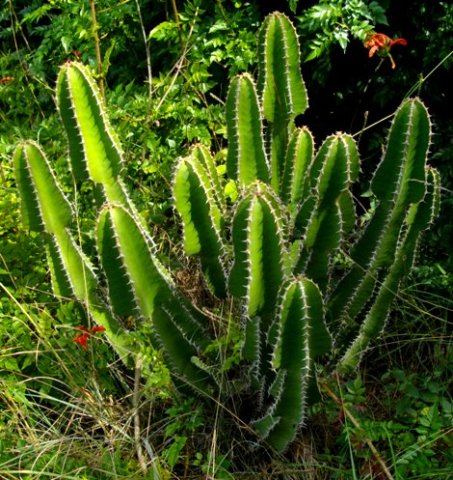Euphorbia cooperi garden transplant

Author: Ivan Lätti
Photographer: Thabo Maphisa
This young candelabra euphorbia planted at the southern foot of the Magaliesberg is showing good growth and adjustment. It was collected in an Operation Wildflower expedition in Mpumalanga a couple of years before. Many thousands of indigenous plants were successfully transplanted according to the system that was used in the past by the Association in collaboration with Nature Conservation.
In cases where the natural distribution of a transplanted species includes the destination garden, as is the case for this Euphorbia cooperi, no untoward ecological effects are expected. Where plants are introduced into new areas, foreign to the natural habitat, plants may die, which can then be used to adapt transplantation practices, i.e. the acceptance of regional incompatibility.
Where transplants flourish, no harm is done as long as plant species invasion doesn’t ensue. Provincial border regulation of plant mobility may help to prevent this, although natural distribution of species don't follow national or provincial borders. It would only work well if natural distributions is enforced per species for all transplant destinations. This begs the question of interference with nature, established practices of commercial agronomy and horticulture.
The conditions under which the introduction of a plant into a new region and habitat will cause invasion are not sufficiently known scientifically or communicated socially (or both).
Economic, social and administrative causes led to the discontinuation of Operation Wildflower in 2019, after more than fifty years of indigenous plant rescue expeditions. The physical destruction of countless plants in nature still continues everywhere during all kinds of human development projects and economic activities. More public sector activity in saving them increases taxes. Unbridled and illegal private sector plant collection threatens biodiversity. Plant collection by citizens without a commercial component, no permission to sell, but only planting on private (or public) land had merit. Maybe some similar solution will be found again at some stage in the future for transplanting rather than bulldozing indigenous plants.

